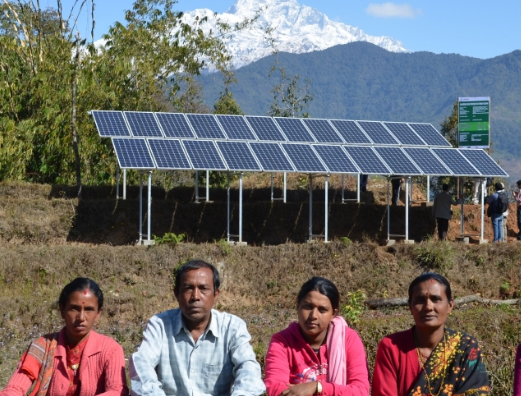News & Updates
Solar panels are bringing 40,000 litres of water a day to families in Nepal
22 February 2018

In April 2015 Nepal experienced a severe earthquake that killed almost 9,000 people and disrupted the lives of 8 million, one of the key disruptions in rural areas was reduced access to clean water.
The recovery process has been a challenge due to a number of reasons including funding delays. However, the introduction of solar panels has provided those in rural areas with clean water and has accelerated the recovery programme.
Following the earthquake Renewable World set up a solar-powered pump in Shikharpur, a settlement approximately 50km from Nepal’s capital Kathmandu which was cut off from clean drinking water following the quake.
The solar-powered pump collects groundwater and transfers it 72 metres up to the village of Shikharpur where it is then stored in tanks. In total, 120 households and a school are served by the pump with each family paying based on individual usage.
Residents have praised the solar-powered pump saying that it has improved health care as better sanitation and clean water have reduced water borne diseases.
It has also been credited for boosting income in the area too as residents no longer have to walk far to fetch water and have more time to take up second jobs.
Two thirds of Nepalese live in hilly or mountainous regions that are remote and difficult to reach with conventional piped water systems. As a result, a large number of people still rely on manually collecting water from distant sources which can have negative impacts of health and livelihood.
This role is typically undertaken by women and children.
The increase in access to water has also boosted farming income within the community as farmers are able to grow more crops to sell.
The project also involves a Marketing Planning Community that is made up of members of the local agriculture community and aims to encourage adaptation and to take advantage of market opportunities.
The committee allows farmers to learn skills in climate smart agriculture such as efficient water use and how to grow off-season crops.
The local farmers are now able to grow off-season vegetables including sweet peppers under sheets that act as a greenhouse and have subsequently increased their income.
Solar irrigation methods are more efficient and reliable than traditional systems, as well as being less vulnerable to erratic rainfall and high altitudes. The introduction of the project will help farmers prepare for the threats of climate change and adapt their methods accordingly.
The technology offers a promising insight into how rural areas can be provided with clean and reliable water in times of increasing water scarcity and a changing climate.
If you’d like to stay informed on the latest updates in aid and development, please sign up to the AIDF newsletter.
Image credit: Renewable World